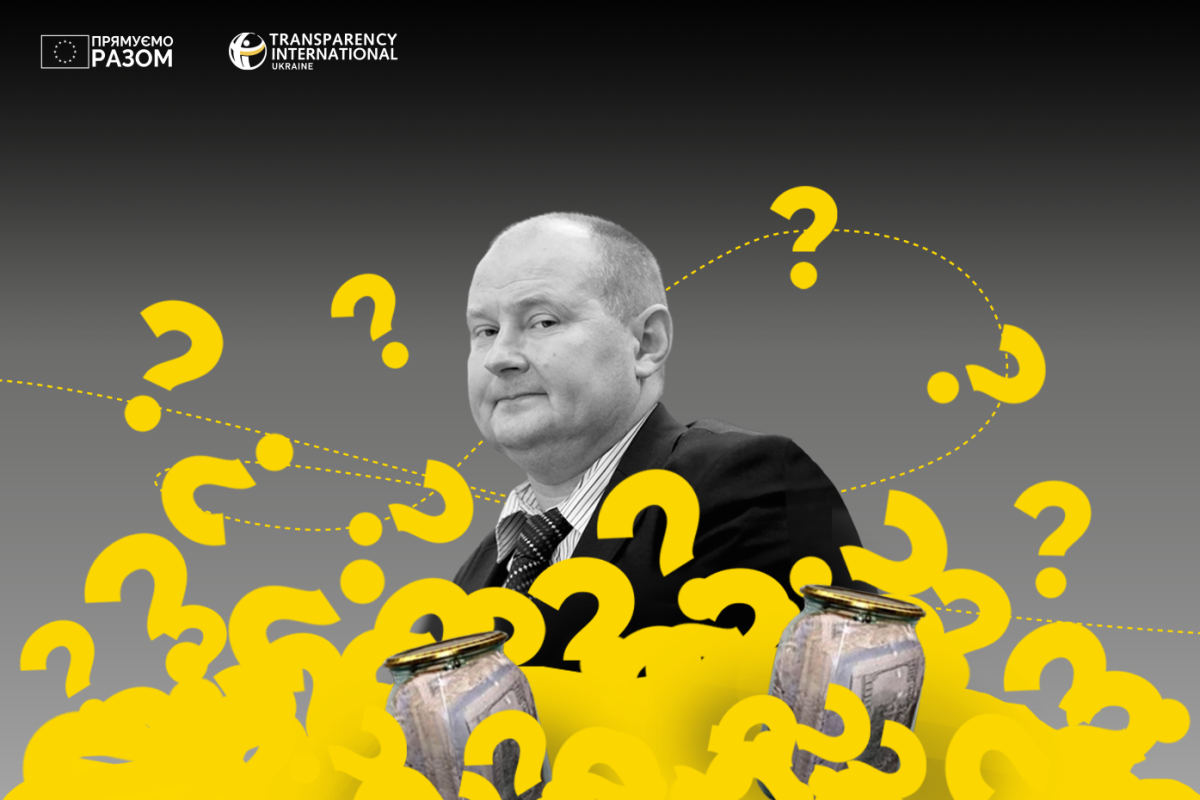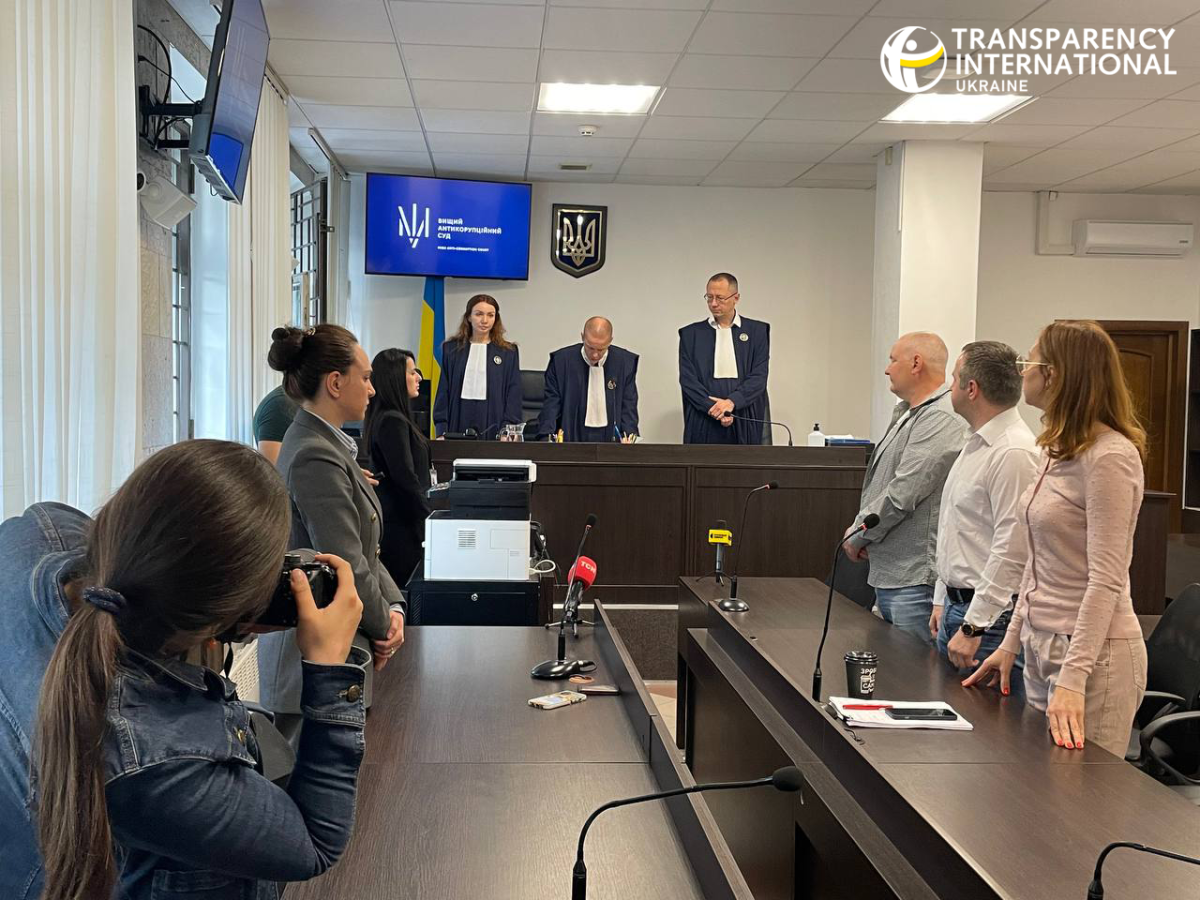

The case of Chaus went down in history with glass jars, in which the judge hid his bribe. But not with jars alone. Literally everything happened there: from the alleged abduction and transfer to Moldova (according to Chaus) to the chase between the SSU and the NABU after Chaus’ return to Ukraine. We covered all this in the first part of the material.
Read on to find out about the details of this trial play.
The finale is almost there. Act 2
Characters:
Mykola Chaus — ex-judge of the Dniprovskyi District Court of Kyiv, the accused
Diana Polishchuk — a petitioner (whistleblower)
Oleksandr Polishchuk — NABU secret agent, ex-husband of Diana Polishchuk
Svitlana Sasevych — mother of Diana Polishchuk, accused of trafficking in potent substances and precursors — diphenhydramine, pseudoephedrine
Controversial issue — provocation of a crime
During the trial, Chaus repeatedly stated there had been a provocation to commit a crime. Interestingly, at the same time, he denied the very fact of committing the crime.
According to Chaus, the provocation was organized by law enforcement agencies for political reasons, namely, given his position as a judge in choosing an interim measure for Hennadii Korban, the leader of the UKROP Political Association.
To distinguish provocation from the permissible behavior of law enforcement agencies, the European Court of Human Rights and the Supreme Court developed evaluation criteria.
The court, when verifying the presence or absence of a provocation by law enforcement agencies, assessed two separate acts of Chaus; each of them qualifies under Art. 368, part 4 of the Criminal Code of Ukraine. Namely, regarding:
- Chaus’ soliciting an unlawful benefit on an especially large scale;
- his obtaining the unlawful benefit on an especially large scale.
Soliciting an unlawful benefit is a crime with a formal element, so it is considered completed from the moment of the demand.
The fact of Chaus’ refusal to continue committing criminal acts influenced exclusively the court’s assessment of further events related to the subject of the proceedings (for the future) and in no way influenced the qualification of the completed crime committed by Chaus before the granting this refusal (for the past).
When assessing the testimony of Oleksandr Polishchuk, the court found the part regarding the events that would not have occurred without active actions on the part of law enforcement agencies and Polishchuk himself inadmissible.
The court indicated that the recorded conversation between Chaus and NABU secret agent Polishchuk on March 28, 2016, consists of two parts in its content. The first part concerns previous events — Chaus soliciting an unlawful benefit. The second part of the conversation concerns future events — Chaus receiving the unlawful benefit. The court recognized the first part as appropriate and admissible evidence, while the second part was inadmissible.
In the first fragment of the conversation, Chaus confirms that he did ask Diana Polishchuk to provide him an unlawful benefit in a specific amount (“We talked about a hundred back then”) and confirms accepting Diana’s counteroffer and halving the amount (“She says they found something of a half, well, a half it is then”). Chaus notes that he also tried to agree upon the specified amount with the leadership of the court, which later changed its opinion: “I went to talk to her again, she… does not hear me.”
As for the second part of the conversation, after finding out the reasons for Chaus’ refusal and obtaining additional evidence of a crime previously committed by the judge, Oleksandr Polishchuk incited Chaus to continue criminal activities to obtain unlawful benefits, namely, by saying the following: “Look, what about approaching this one, the head?”
Thus, Oleksandr Polishchuk went beyond the purpose of controlling the commission of a crime and, by his statements, encouraged Chaus to continue criminal activity, and also suggested personally removing obstacles.
Therefore, the court concluded that from that moment on, Oleksandr Polishchuk, through his actions as an agent, deliberately switched from checking the circumstances of refusal and collecting evidence of Chaus’ previous criminal activity to creating artificial conditions for the continuation of criminal activity.
Sentencing of Chaus, June 14, 2023
According to Chaus, the provocation was organized by law enforcement agencies for political reasons, namely, given his position as a judge in choosing an interim measure for Hennadii Korban, the leader of the UKROP Political Association.
How to assess whether there was any provocation at all?
The issue of provoking a crime has both an ethical and a legal aspect. Provocation can violate the principles of personal freedom, given that people can commit a crime that they would not have committed without external influence.
According to the practice of the ECHR, secret agents should try to investigate current criminal activities passively and not influence the incitement to a crime apart from the one committed, or the one that can be committed without such incitement. The evidence obtained as a result of a provocation should be recognized as inadmissible, since it was obtained as a result of a significant violation of the human right to a fair trial, which is enshrined in Article 6, clause 1 of the Convention for the Protection of Human Rights and Fundamental Freedoms.
The main question to be answered by the court when assessing whether there was a provocation: would there have been a crime if it had not been for the intervention of law enforcement officers?
The court is obliged not only to state the fact of a provocation, but also to establish specific signs, forms of external detection of a provocation — in which actions the provocation consisted, whose and what actions contain its signs.
Incitement occurs when the agents involved — whether law enforcement officers or persons acting on their instructions — are not limited to investigating criminal activity in a predominantly passive manner. They exert such influence on a person to induce them to commit a crime that would not otherwise have occurred.
It cannot be considered passive behavior of the authorities when the initiative in contact with the suspect comes from the agent, when the offer is renewed after the initial refusal, or when a person is persistently tempted to commit a crime.
The Supreme Court in its practice constantly emphasizes that when analyzing the communication between the petitioner and the accused, the court should pay attention to several important aspects: excessive persistence in the petitioner’s communication with the accused, the frequency of the accused’s contacts with the petitioner and persistence in organizing an agent’s meeting with the accused, repeated persuasion by the agent in private communication, as well as lack of pressure on the agent by the accused.
Therefore, there are many criteria that the court should evaluate when determining the presence or absence of a provocation.
The main question to be answered by the court when assessing whether there was a provocation: would there have been a crime if it had not been for the intervention of law enforcement officers?
What did the trial of Chaus show?
The HACC thoroughly approached the case and carefully assessed the evidence and its admissibility, in particular, the presence or absence of a provocation in the case. Although, in our opinion, the criteria for the presence of a provocation could have been described in more detail in the court ruling, and the fact that Chaus, as a judge, knew how to behave in order to avoid responsibility should have been considered, including referring to the presence of a provocation.
Regardless of whether the activity of Oleksandr Polishchuk really contained signs of a provocation, these circumstances have nothing to do with Chaus soliciting a bribe from Diana Polishchuk for settling her mother’s case.
The court declared any evidence of a crime collected after March 28, 2016, since the provocation, inadmissible, including the famous glass jars and the cash that was found in them.
In the presence of a provocation, it is impossible to establish whether Chaus would have acted if there had been no provocation.
But this did not affect the qualification. The court found Chaus guilty of committing a crime under Article 368, part 4 of the Criminal Code of Ukraine, and sentenced him to 10 years in prison with deprivation of the right to hold certain positions for 3 years and confiscation of all property belonging to him on the right of ownership.
Chaus was convicted precisely because he asked for USD 100,000 from Diana Polishchuk; the court recognized the receipt of USD 150,000 from Oleksandr Polishchuk as a provocation.
If the HACC did not recognize the fact of provocation, then Chaus would have been found guilty of soliciting and receiving a bribe, which also falls under the qualification under Art. 368, part 4 of the Criminal Code of Ukraine. The only thing that would change in this case is that the court could impose the maximum possible term, namely, 12 years of imprisonment.
The court declared any evidence of a crime collected after March 28, 2016, since the provocation, inadmissible, including the famous glass jars and the cash that was found in them.
This publication was prepared with the financial support of the European Union. Its content is the sole responsibility of Transparency International Ukraine and does not necessarily reflect the views of the European Union.







